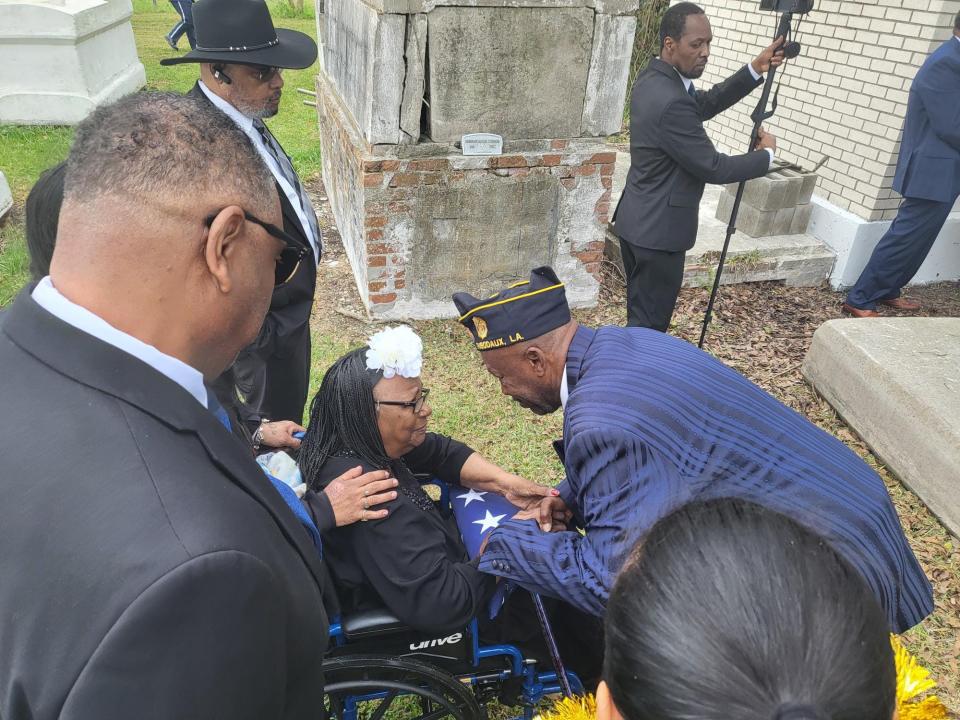Descendant of Thibodaux Massacre survivor laid to rest with full military honors
A living link to victims of one of Thibodaux's darkest and bloodiest hours was laid to rest Saturday with full military honors.
Sylvester Arthur Jackson, 91, was the great-grandson of Jack Conrad, whose sworn testimony of the Thibodaux Massacre of 1887 is a firsthand account from a surviving victim of the shooting that left countless dead, including Conrad's son and brother-in-law. Conrad and his daughter survived the event, Conrad having taken four gunshot wounds, Nov. 23, 1887.
Jackson was entombed with his grandparents, Clara and Jesse Jackson, March 9, at the Thibodaux Allen Chapel Cemetery. After a service at St. Luke Community Center, mourners followed the hearse in a second-line for nearly three blocks, garbed in Mardi Gras-style clothes, parasols, white gloves and sashes with doves on their shoulders.

"If Clara hadn't survived, we wouldn't be here," Barron Jackson, 63, Sylvester's son said.
Sylvester Jackson represents a family tradition of service. Like his great-grandfather, Jackson joined the military. He served active-duty in the Air Force for four years, then with the Air Force, Army, and Navy Reserves for an additional 30 years. Afterward, he continued a professional career of service, becoming the head of the U.S. State Department's passport center in Houston and continuing the work in Washington, D.C., for a total of 20 years.
Don Kollins, 47, Jackson's son-in-law, said when Jackson led, everyone followed. No one in the family questioned his decisions. He described him as dignified and honorable.
"He is a man of his words," Kollins said. "What I mean is he is a patriarch. What he says, he stands by, and when he says it, he does it. He is a man who stands by his words."
In his off-time, Jackson enjoyed carpentry, woodwork and photography. Baron recalled how his father's love of carpentry played into his early life. He said his father encouraged his passion for science by building a science table, complete with beakers and test tubes, for him to do experiments.
"I was all into science, so he helped me build stuff like a workbench with test tubes and microscopes," Baron said. "He bought me a telescope – it was during the Apollo program."
Little did Baron know that encouragement tied directly into his future. He now works for the Space Force, which focuses on all aspects of space defense. Baron pursued video technology but was persuaded by his father to join the Air Force, so he signed up for four years. Thirty-nine years later – 22 active and 17 as a civilian – he now plans to retire in three years.
For those wanting to see Jackson's craftsmanship, a house still stands at 417 Brandywine Blvd. that he built, Barron said.
Even those who weren't immediate family said Jackson had a fatherly approach with them.
Earl Vanburen, 62, was enlisted as an Army Infantryman when he met Jackson and began a 25-year friendship. The two were activated for Operation Desert Storm and sent to Fort Hood Texas ‒ now Fort Cavazos. Twenty-nine years his senior, Vanburen said Jackson was a supply runner and gofer and used his free time to look after him.
"He was like a daddy to me," Vanburen said. "The drill was like a week and a month and every month he'd come pick me up from my house."
Asked what the two bonded over, he grinned, chuckled, and said, "I can't talk about that."
The History
A local journalist, John DeSantis, uncovered a day of violence that left 30 to 60 Black residents murdered by white vigilantes, for a sugarcane strike in 1887. DeSantis and Jackson's lives became entwined as the writer told the family's and the city's past.
"Sylvester Jackson was the epitome of a gentleman, and I have wondered how God could have gifted one man with so much grace and so much dignity," DeSantis said.
The history had been buried along with an alleged unmarked mass grave, and the story never told. DeSantis found Conrad's affidavit tucked away in a file held in the U.S. National Archives. It was created when Conrad sought a special military pension.
At the time, military pensions extended beyond active duty, so long as the injury wasn't from gross negligence. Conrad's injury was not self-inflicted.
Thibodaux had become a gathering site for freed Black sugarcane workers who were protesting unlivable wages. White vigilantes, 50 to 60 depending on the account, spread throughout the city and killed Black men they found.
"There were several companies of white men and they went around... shooting colored men who took part in the strike," according to one witness account.
They arrived at Conrad's home, threatened his wife, and demanded all the men come outside. When Conrad stepped outside, according to his own words, one of the mob said "crack down on him," and the bullets began flying.
Jackson's mother, Clarrise (Clara), said her father crawled under the home for safety, but they continued firing on him. When all was said and done, Conrad had been shot in both arms and twice in the chest. One gunshot left his collar bone protruding from his body. Confident in their grisly work, the gunmen left him for dead.
Local oral histories maintain that the bodies were disposed of in an unmarked mass grave that has to this day remained unfound. Efforts were made with tools like ground-penetrating radar at the lot behind the Raymond Stafford Post 513 American Legion Hall. The search was inconclusive, due to the site being used as a landfill and capped over by concrete between the time of the massacre and present day.
This article originally appeared on The Courier: Descendant of Thibodaux Massacre survivor laid to rest

